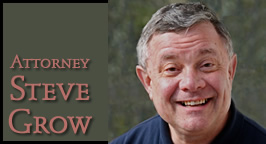By
Attorney Steve Grow
April 13, 2012
NewsWithViews.com
The Supreme Court in recent years has, quite properly in my view, struck down various restrictions on political contributions. The Court quite correctly considers that money talks, and that all but the most minimal restrictions on that talk violates the First Amendment. Speech on political and commercial subjects is vitally important to assure the full, fair and vociferous exchange of views that alone has the chance of bringing us to our senses, somewhat at least, before we vote in elections or, if we are in public office or in the public employ, before we vote on legislation or adopt policies affecting our lives and our economy.
The First Amendment quite properly bars Congress from enacting any law abridging free speech. And various court decisions have held the First Amendment applicable to the states. Most state constitutions protect the right anyway.
Now the right belongs primarily to individuals, but, of course, individuals may choose to act through associations, organizations and entities, including corporations and labor unions and other entities, among others. Corporations and labor unions are, after all, creations and associations of individuals and of governments formed and constituted by individuals. If individuals choose to act through such entities, to expend funds on political speech, then, in my view, they should be free to do so. I even believe that churches and other not-for-profit corporations and entities should be free to engage in political speech, and believe that the Johnson Amendment should be repealed, or declared unconstitutional--so that preachers and other officials of such entities are unmuzzled and free to speak on any matter as they deem appropriate. See my previous article “Unmuzzle the Preachers” [make this a link], on this website.
I believe any individual should be free to contribute to a political campaign or political fund for the promotion or opposition of any political candidate or public policy.
However, I believe it plainly unconstitutional to require any individual to do so involuntarily, on any pretext or at any time. Here’s why.
The freedom to speak implies the freedom to choose whether to speak, how much to speak, about what to speak, and for (or against) whom or what to speak. Now, if I choose voluntarily to contribute, say $500, to a political fund of some sort, then I have voluntarily chosen to subject the details of the spending, or nonspending, decision to whomever controls those matters for the fund I have contributed to. That should be allowed. But if I am forced to contribute, on any pretext whatsoever, then my money may be spent or not spent in a way I would not choose, by people I have not chosen to entrust such decisions to. Moreover, if I have had to contribute, say $500, involuntarily to any such fund, then that is $500 worth of potential political speech that I cannot thereafter exercise as, and if, I choose. It has thus taken away part of my power to speak with money as I see fit.
If any or all of that involuntarily contribution is spent supporting policies or candidates I oppose, that is all the worse. If I have voluntarily contributed, I have willingly assumed that risk—and I have to live with the consequences of my choice. Certainly, no one should be forced, as a direct or indirect condition of employment, in the private sector or government, to have to make any involuntary contribution usable for political purposes. Even a person agreeing to make a series of political contributions should be deemed to have made only an unenforceable pledge--each installment or payment would be fully voluntary in the sense that the person could refuse to make any or all of them.
| Subscribe to the NewsWithViews Daily News Alerts! |
I believe the First Amendment, properly interpreted, makes any arrangement requiring political contributions by any individual to any fund or entity to be plainly unconstitutional—a gross violation of that individual’s constitutional right of free speech. Any and all such arrangements, in any shape whatsoever, should be declared unconstitutional and void on their face, and unenforceable by any court. Any person, government, government official or entity seeking to circumvent this should be deemed to be violating the individual’s civil rights.
� 2012 Steve Grow - All Rights Reserved
Steve Grow holds degrees in physics, law and philosophy. He is a retired lawyer who practiced business law for many years. He studied philosophy and cognitive psychology at the graduate level, including working with one of the world’s leading scholars on the work of Aristotle. He was co-editor in chief of his college newspaper. He has observed and wondered about history, psychology, religion, politics, journalism and good (and bad) government since childhood.
He believes that, now and always, the central problem in politics is monitoring and governing those in political positions—so that ordinary people are the ultimate governors and can hold those in office fully accountable. Ordinary people deserve, and need, full legal protection of their privacy. In contrast, all activities of those in government should be open to full scrutiny at all times. In a certain sense, ordinary people should be “ungovernable” and accorded a broad measure of privacy – on the other hand, politicians and their actions should be open to monitoring, closely watched and constrained. Anyone with a contrary view, he believes, is an enemy of freedom—wittingly or unwittingly.
E-Mail: grow736-nwv@yahoo.com











 Share
This Article
Share
This Article





